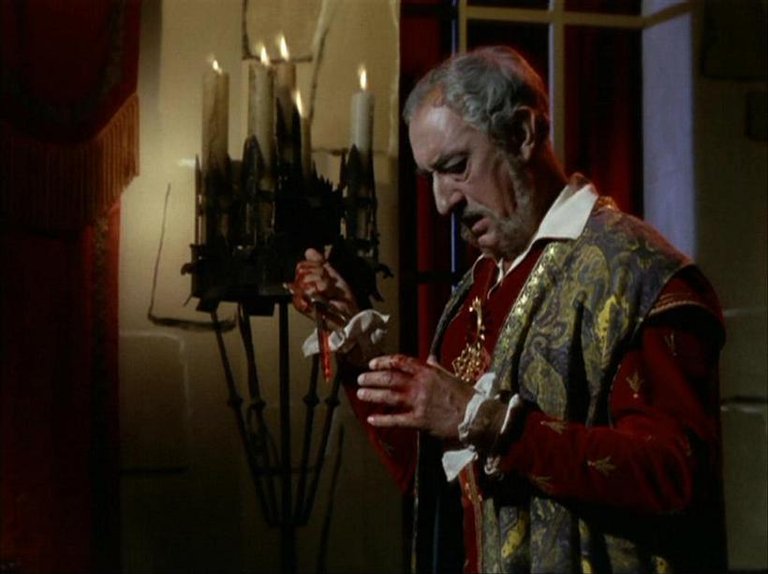Television Review: The Conscience of the King (Star Trek, S1X12, 1966)

The Conscience of the King (S01E12)
Airdate: December 8th 1966
Written by: Barry Trivers
Directed by: Gary Oswald
Running Time: 50 minutes
Every television show is a product of its time, and this notion holds true even for series like Star Trek: The Original Series, which is set in a futuristic universe. However, the temporal influences are more pronounced in certain episodes than in others. One such episode is The Conscience of the King, which aired as part of Season 1.
The plot of The Conscience of the King commences with the USS Enterprise arriving at Planet Q after receiving a call from Dr. Thomas Leighton, portrayed by William Sargent. Leighton, a scientist and an old acquaintance of Captain Kirk, invites him to discuss a shipment of synthetic food that could potentially alleviate famine on a nearby colony. However, upon arrival, Kirk uncovers a far more sinister and personal motive behind his visit. A troupe of renowned Shakespearean actors, led by Anton Karidian (played by Arnold Moss), has come to perform. Leighton recognises Karidian as Kodos the Executioner, the former governor responsible for the mass murder of 4,000 colonists on Tarsus IV two decades prior, driven by his eugenics beliefs. Both Leighton and a young Kirk were witnesses to this atrocity; however, while Leighton is convinced that Karidian is indeed Kodos, Kirk remains uncertain. The situation escalates when Leighton dies under suspicious circumstances, prompting Kirk to employ deception to investigate further aboard the Enterprise by bringing Karidian and his troupe onboard. Complicating matters are Kirk's burgeoning feelings for Karidian's daughter Lenore (played by Barbara Anderson) and the doubts expressed by his friends Spock and McCoy regarding whether his quest for justice is clouding his judgment.
Despite its intriguing premise, The Conscience of the King is not typically regarded as one of the classics among Star Trek enthusiasts. A significant factor contributing to this perception is its inherent theatricality. The script by Barry Trivers often feels reminiscent of fan fiction inspired by Hamlet, with its melodramatic tone and predictable ending. While there are occasional shifts in scenery, much of the episode resembles a stage play rather than a dynamic television narrative. Critics have noted that the episode's reliance on theatrical conventions detracts from its overall impact, leading to an experience that can feel more like an extended performance than a compelling story.
Conversely, "The Conscience of the King" establishes a notable tradition within Star Trek by incorporating Shakespearean dialogue and themes into its narrative framework—a practice that likely resonated with William Shatner, who frequently highlighted his own Shakespearean roots. Shatner's performance is particularly noteworthy in this episode; he effectively conveys Kirk's internal struggle as he grapples with conflicting desires: his attraction to Lenore, his thirst for revenge against Kodos, and his responsibilities as captain of the Enterprise.
The supporting cast also delivers commendable performances, particularly Barbara Anderson as Lenore. Her portrayal of a seductive young woman gradually succumbing to madness is strikingly memorable; her performance often eclipses that of Arnold Moss as her father Karidian.
Interestingly, an apparent casting error ultimately benefited the episode's execution. Actor Bruce Hyde was cast without producers recalling that he had previously portrayed Lt. Riley in an earlier episode, The Naked Time. Upon realising this oversight, they renamed his character for "The Conscience of the King." Hyde seized this opportunity to showcase his skills as he transitioned from a comedic role to embodying a tragic character who had witnessed Kodos' atrocities and sought vengeance at great personal cost.
While The Conscience of the King features strong performances and competent direction reflective of 1960s television standards, it has not aged particularly well. One glaring aspect is its depiction of voice recognition as a method for identifying individuals—an approach that appears strangely primitive and inefficient within the high-tech context of the 23rd century envisioned in Star Trek.
Moreover, it is important to note that the episode draws inspiration from real historical events or rather from mid-1960s perceptions surrounding them—specifically, theories about Adolf Hitler's alleged survival following his fall in Berlin and subsequent evasion of justice over two decades. The parallels between Kodos and Hitler are evident; however, Gene Roddenberry’s optimistic vision for the 23rd century suggests that such malevolent figures would be rare exceptions rather than commonplace occurrences.
Intriguingly, while the concept of a Hitler-like villain escaping justice by reinventing himself as an entertainer might have seemed far-fetched in the 1960s, it has since found eerie resonance in contemporary reality. For instance, in 2008, Radovan Karadžić—charged with war crimes during the Bosnian War—was apprehended after successfully evading capture for over fifteen years by assuming the identity of an alternative medicine practitioner. His case serves as a stark reminder that fiction can sometimes mirror real life in unsettling ways.
While The Conscience of the King may not stand out among fan-favourite episodes due to its theatricality and predictable plot twists, it nonetheless offers valuable insights into character development and thematic exploration reflective of its time.
RATING: 6/10 (++)
Blog in Croatian https://draxblog.com
Blog in English https://draxreview.wordpress.com/
InLeo blog https://inleo.io/@drax.leo
InLeo: https://inleo.io/signup?referral=drax.leo
Hiveonboard: https://hiveonboard.com?ref=drax
Rising Star game: https://www.risingstargame.com?referrer=drax
1Inch: https://1inch.exchange/#/r/0x83823d8CCB74F828148258BB4457642124b1328e
BTC donations: 1EWxiMiP6iiG9rger3NuUSd6HByaxQWafG
ETH donations: 0xB305F144323b99e6f8b1d66f5D7DE78B498C32A7
BCH donations: qpvxw0jax79lhmvlgcldkzpqanf03r9cjv8y6gtmk9
Posted Using INLEO